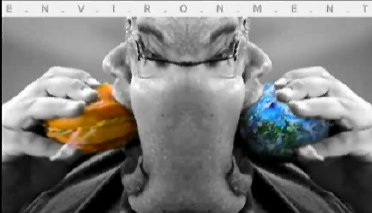
Some 1% of the world population are eating hamburgers every day, which are a typical American fast food. Hamburgers tempt people with freshly baked bread, fresh vegetable, a piece of meat and sauce. But there is an inconvenient truth behind the making of hamburgers: the destruction of tropical forests of Central America. Entire forests have been cleared for pasture land needed to make beef, the essential ingredient for a hamburger.
To make 100 grams of beef equivalent to one hamburger patty, which is 1.5 pyeong of forest and 2000 liters of water are needed. Empty space of 1.5 pyeong of forest and a piece of beef influence global warming. Mexican environmentalist Gabriel Goadry calls this link the 'Destruction of tropical forests→Raising beef cattle→Production of Hamburgers', which is anti-ecological 'Hamburger connection'. According to his data analysis, 25% of central American forests has disappeared to make pasture land since 1960. Furthermore, at the end of 1970, 2/3 of farm land changed to pasture land. In this mechanism, hamburger, which citizens of the world like to eat, has traded places with tropical forest, a valuable resource.
Also the fact that hamburger itself is not good for health is well known. Especially the 'Hamburger experiment' by an American nutritionist shocked many people recently. She was a grandmother of 8 children, and the experiment was simple. Leave McDonald Happy Meal set as it is for 1 year. Bruso observed the speed in which the hamburger decomposed. What was the result? The picture taken at 2009 was little different from the picture taken in 2010 except for the crumpled bread and patty. Bruso stated her views in her blog that "In the process of experiment, although I opened the window flies and insects did not approach the happy meal set. Because of preservatives, decomposition was slow. Also I detected additives in the fried potato that can preserve color. You can know why hamburger is called junk food". 
△'Hamburger experiment', the left side of picture taken at 2009, the right side of picture taken at 2010.
The concerns about food are increasing. The alternative restaurant located in Busan Namcheon-dong next to Indigo lecture hall is selling justice trade coffee and herb tea. These received a positive response from teenagers who are eating instant noodles and gimbab after school for their meals. This restaurant opened in 2007 in response to teenagers' proposal. They wanted a restaurant offering food that did not destroy the environment and their health after a discussion about the hamburger connection. Jeong Yoon-hee, who is the head of the Indigo lecture hall, explained that "By eating in this restaurant children who are tired of studying are given an opportunity to think of the relationship between themselves, environment, and the world. This small restaurant is for small innovators".
Reporter Choi Jung-in
hakboji@donga.ac.kr
2010 May 13th

